Abstract
Two hundred patients (156 women) with the irritable bowel syndrome were treated with dietary exclusion for three weeks. Of the 189 who completed this study, 91 (48.2%) showed symptomatic improvement. Subsequent challenge with individual foods showed that 73 of these 91 responders were able to identify one or more food intolerances and 72 remained well on a modified diet during the follow up period (mean (SD), 14.7 (7.98) months). Of the 98 patients who showed no symptomatic improvement after three weeks of strict exclusion only three were symptomatically well at follow up (mean (SD), 12.48 (8.09 months). There was no close correlation between response and symptom complex. There was a wide range of food intolerance. The majority (50%) identified two to five foods which upset them (range 1-14). The foods most commonly incriminated were dairy products (40.7%) and grains (39.4%).
Full text
PDF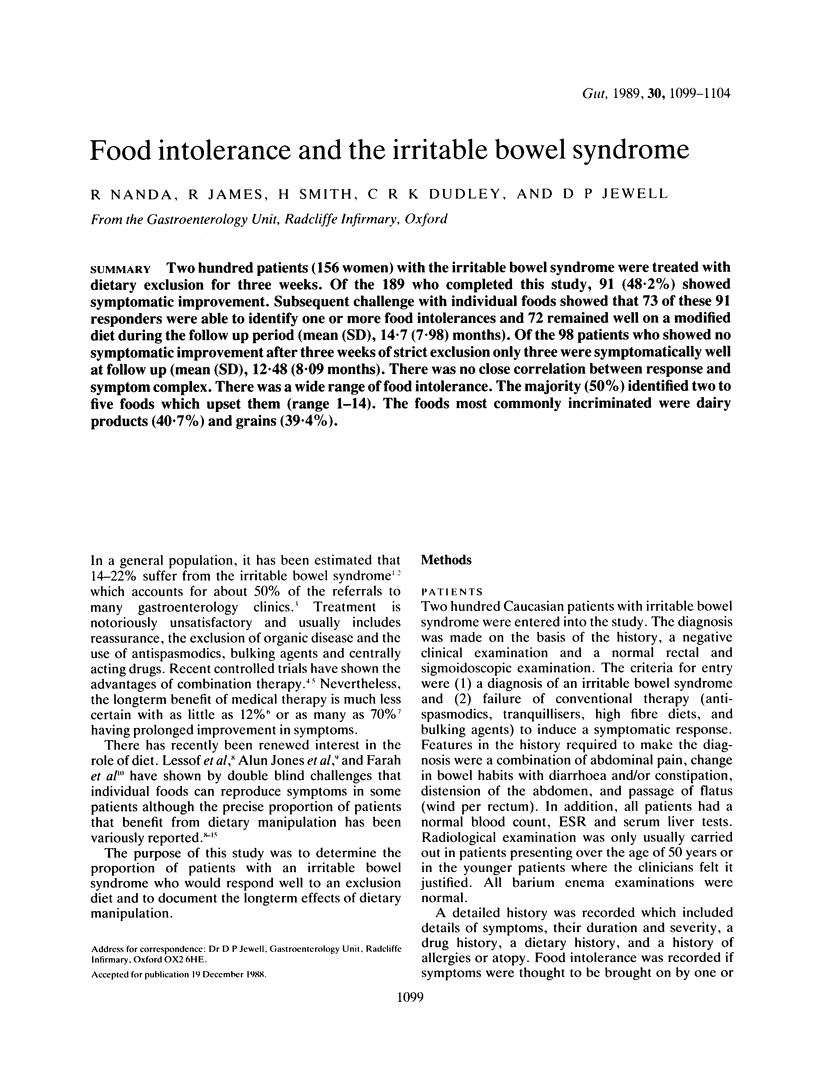
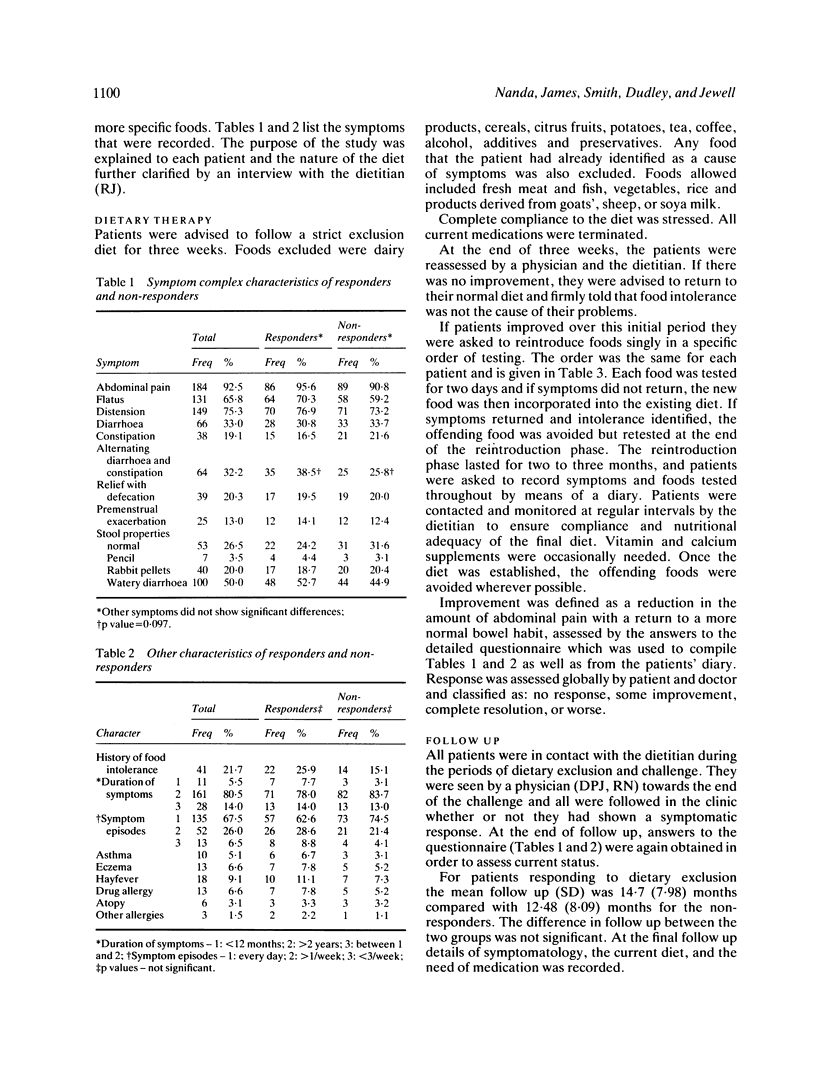
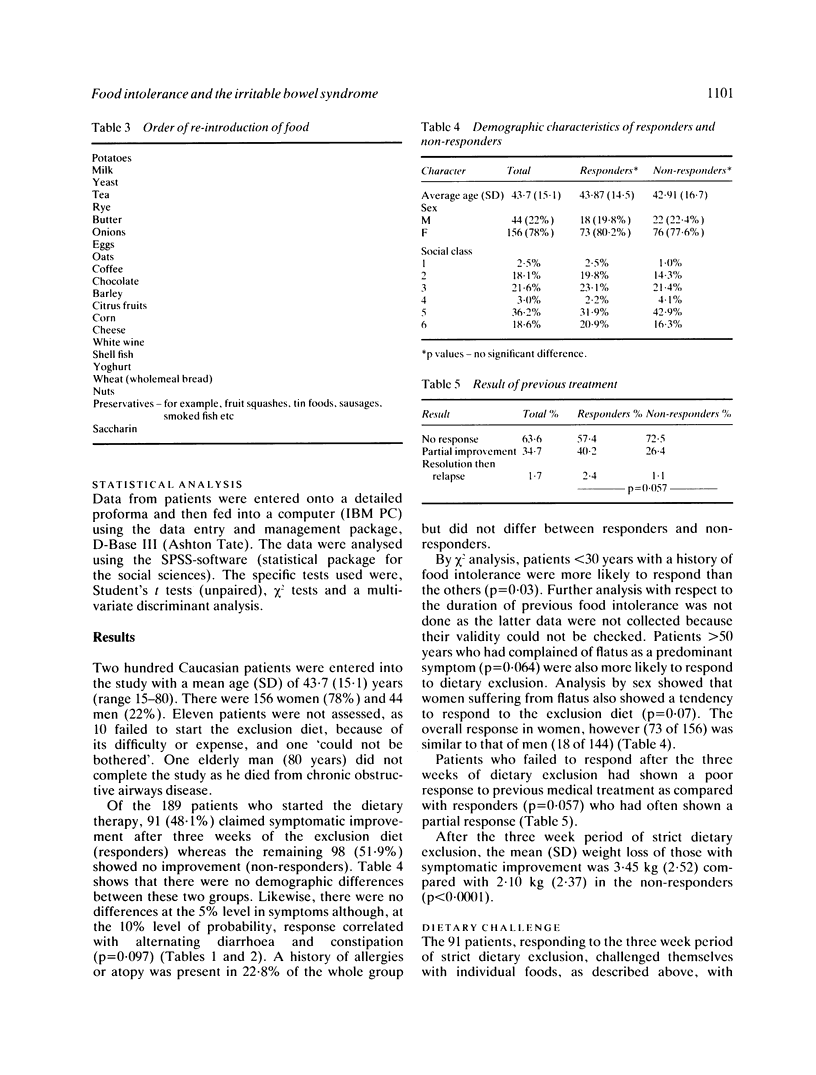
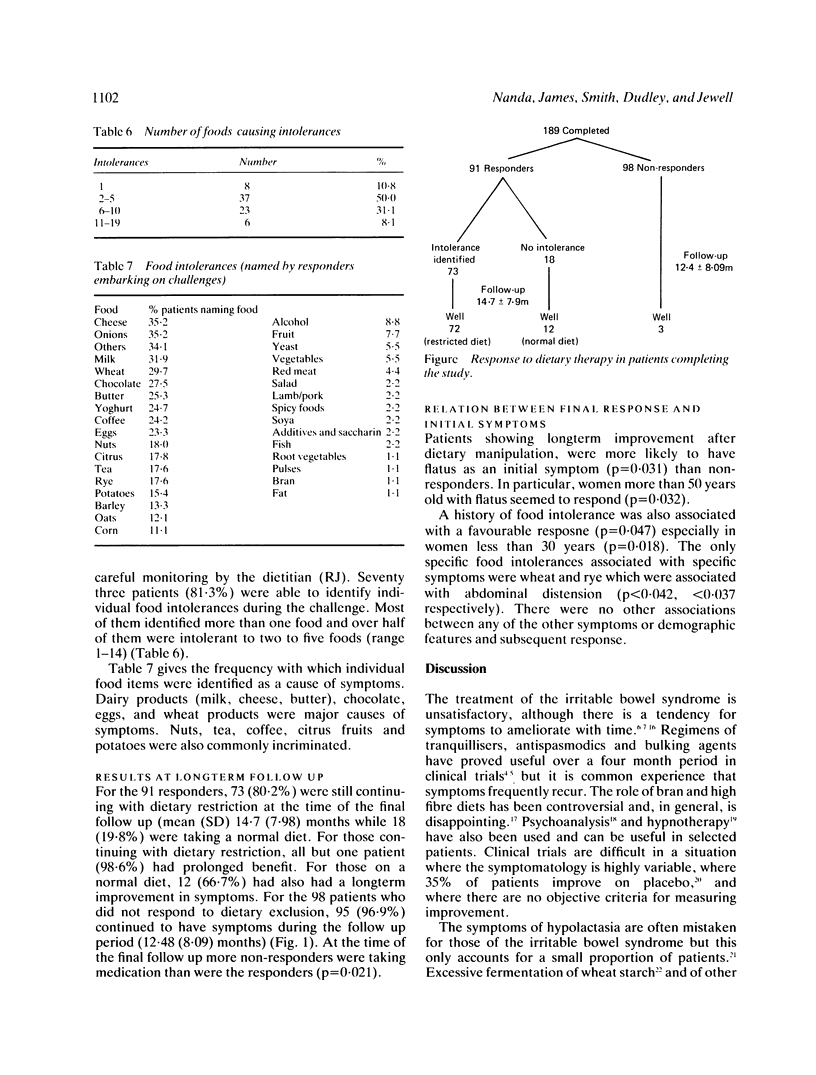
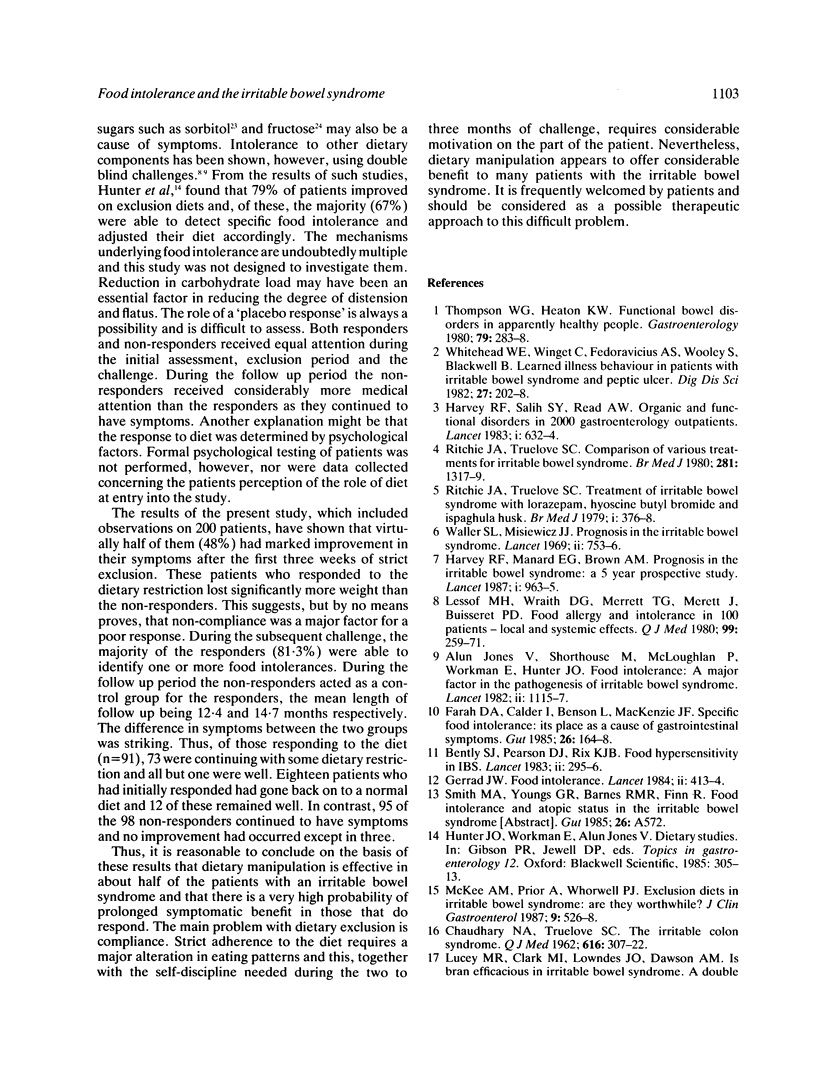
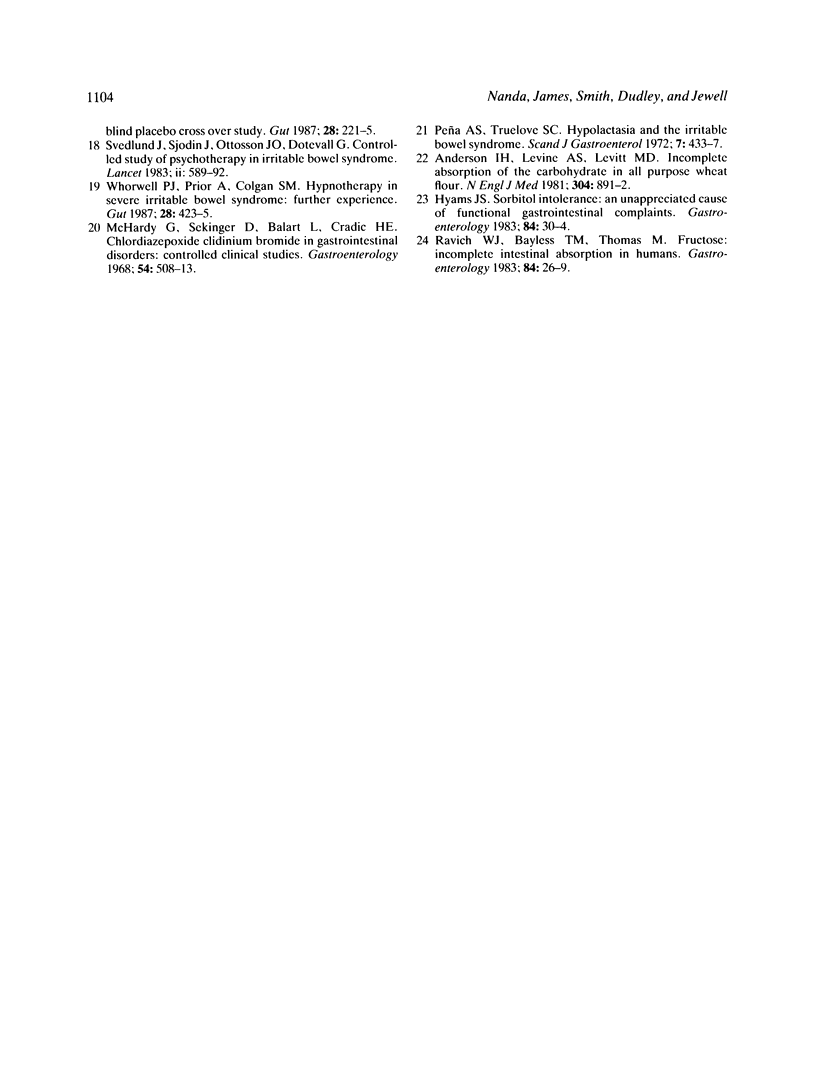
Selected References
These references are in PubMed. This may not be the complete list of references from this article.
- Anderson I. H., Levine A. S., Levitt M. D. Incomplete absorption of the carbohydrate in all-purpose wheat flour. N Engl J Med. 1981 Apr 9;304(15):891–892. doi: 10.1056/NEJM198104093041507. [DOI] [PubMed] [Google Scholar]
- Bentley S. J., Pearson D. J., Rix K. J. Food hypersensitivity in irritable bowel syndrome. Lancet. 1983 Aug 6;2(8345):295–297. doi: 10.1016/s0140-6736(83)90285-4. [DOI] [PubMed] [Google Scholar]
- CHAUDHARY N. A., TRUELOVE S. C. The irritable colon syndrome. A study of the clinical features, predisposing causes, and prognosis in 130 cases. Q J Med. 1962 Jul;31:307–322. [PubMed] [Google Scholar]
- Farah D. A., Calder I., Benson L., MacKenzie J. F. Specific food intolerance: its place as a cause of gastrointestinal symptoms. Gut. 1985 Feb;26(2):164–168. doi: 10.1136/gut.26.2.164. [DOI] [PMC free article] [PubMed] [Google Scholar]
- Harvey R. F., Mauad E. C., Brown A. M. Prognosis in the irritable bowel syndrome: a 5-year prospective study. Lancet. 1987 Apr 25;1(8539):963–965. doi: 10.1016/s0140-6736(87)90304-7. [DOI] [PubMed] [Google Scholar]
- Harvey R. F., Salih S. Y., Read A. E. Organic and functional disorders in 2000 gastroenterology outpatients. Lancet. 1983 Mar 19;1(8325):632–634. doi: 10.1016/s0140-6736(83)91802-0. [DOI] [PubMed] [Google Scholar]
- Hyams J. S. Sorbitol intolerance: an unappreciated cause of functional gastrointestinal complaints. Gastroenterology. 1983 Jan;84(1):30–33. [PubMed] [Google Scholar]
- Jones V. A., McLaughlan P., Shorthouse M., Workman E., Hunter J. O. Food intolerance: a major factor in the pathogenesis of irritable bowel syndrome. Lancet. 1982 Nov 20;2(8308):1115–1117. doi: 10.1016/s0140-6736(82)92782-9. [DOI] [PubMed] [Google Scholar]
- Lessof M. H., Wraith D. G., Merrett T. G., Merrett J., Buisseret P. D. Food allergy and intolerance in 100 patients---local and systemic effects. Q J Med. 1980;49(195):259–271. [PubMed] [Google Scholar]
- Lucey M. R., Clark M. L., Lowndes J., Dawson A. M. Is bran efficacious in irritable bowel syndrome? A double blind placebo controlled crossover study. Gut. 1987 Feb;28(2):221–225. doi: 10.1136/gut.28.2.221. [DOI] [PMC free article] [PubMed] [Google Scholar]
- McKee A. M., Prior A., Whorwell P. J. Exclusion diets in irritable bowel syndrome: are they worthwhile? J Clin Gastroenterol. 1987 Oct;9(5):526–528. doi: 10.1097/00004836-198710000-00007. [DOI] [PubMed] [Google Scholar]
- Pena A. S., Truelove S. C. Hypolactasia and the irritable colon syndrome. Scand J Gastroenterol. 1972;7(5):433–438. doi: 10.3109/00365527209180766. [DOI] [PubMed] [Google Scholar]
- Ravich W. J., Bayless T. M., Thomas M. Fructose: incomplete intestinal absorption in humans. Gastroenterology. 1983 Jan;84(1):26–29. [PubMed] [Google Scholar]
- Ritchie J. A., Truelove S. C. Comparison of various treatments for irritable bowel syndrome. Br Med J. 1980 Nov 15;281(6251):1317–1319. doi: 10.1136/bmj.281.6251.1317. [DOI] [PMC free article] [PubMed] [Google Scholar]
- Ritchie J. A., Truelove S. C. Treatment of irritable bowel syndrome with lorazepam, hyoscine butylbromide, and ispaghula husk. Br Med J. 1979 Feb 10;1(6160):376–378. doi: 10.1136/bmj.1.6160.376. [DOI] [PMC free article] [PubMed] [Google Scholar]
- Svedlund J., Sjödin I., Ottosson J. O., Dotevall G. Controlled study of psychotherapy in irritable bowel syndrome. Lancet. 1983 Sep 10;2(8350):589–592. doi: 10.1016/s0140-6736(83)90678-5. [DOI] [PubMed] [Google Scholar]
- Thompson W. G., Heaton K. W. Functional bowel disorders in apparently healthy people. Gastroenterology. 1980 Aug;79(2):283–288. [PubMed] [Google Scholar]
- Whitehead W. E., Winget C., Fedoravicius A. S., Wooley S., Blackwell B. Learned illness behavior in patients with irritable bowel syndrome and peptic ulcer. Dig Dis Sci. 1982 Mar;27(3):202–208. doi: 10.1007/BF01296915. [DOI] [PubMed] [Google Scholar]
- Whorwell P. J., Prior A., Colgan S. M. Hypnotherapy in severe irritable bowel syndrome: further experience. Gut. 1987 Apr;28(4):423–425. doi: 10.1136/gut.28.4.423. [DOI] [PMC free article] [PubMed] [Google Scholar]


